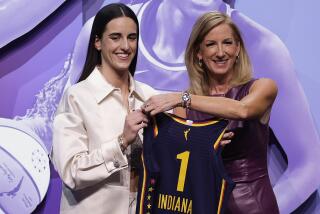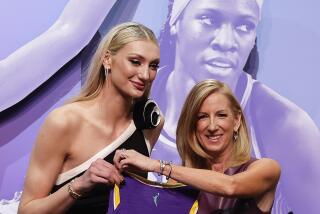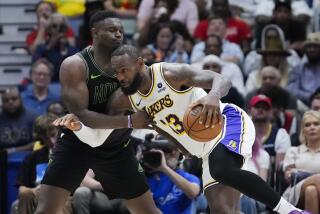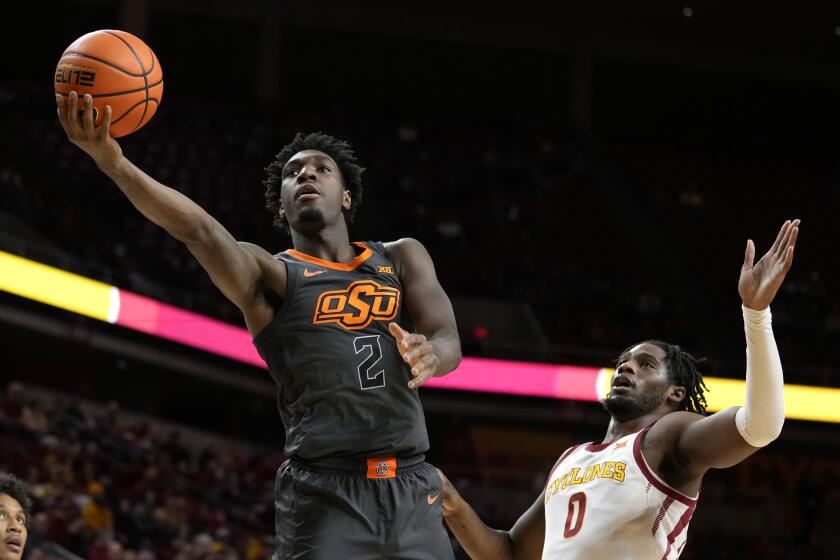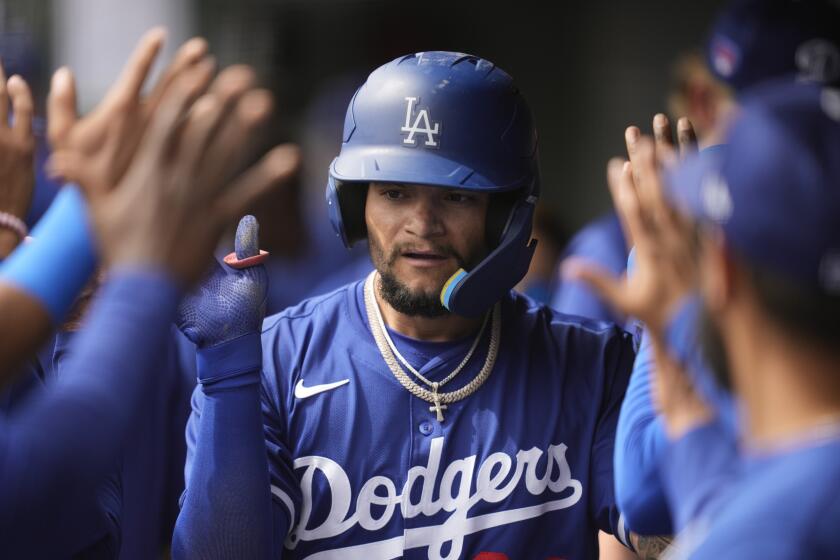For ex-Pepperdine basketball star William ‘Bird’ Averitt, sky was once the limit
Winging west from Kentucky, William “Bird” Averitt once soared majestically for the Pepperdine basketball team.
These days, he rarely leaves his nest.
The nation’s leading scorer during the 1972-73 season, when he averaged nearly 34 points a game for a school that had not yet built a gym on its then-newly opened Malibu campus, Averitt long ago clipped his wings.
“I pretty much stay to myself,” he says from his hometown of Hopkinsville, Ky., where he returned more than 25 years ago and never left. “I stay around the house.”
That’s partly because of an automobile accident 15 years ago that left him partially disabled and unable to drive.
Averitt, 57, says he was driving home from a fishing trip with a girlfriend and her three children when his vehicle flipped as he swerved on loose gravel to avoid a head-on collision. He suffered a broken neck and injuries to his right arm.
He says the range of motion in his neck is limited, which is why he can’t drive, and his right arm is mostly useless.
“I hurt all the time,” says Averitt, who has a steel plate in his neck, “but I’m thankful that how the accident went down, by my driving, that everyone else came out all right. I’d probably be in worse shape, emotionally, if I’d hurt the kids or their mother.”
Twice divorced, he has two daughters of his own and five grandchildren. He lives only a short walk from the house he grew up in and says he stays there often with his mother, Mary.
From a bedroom, he looks out on the vacant lot where he learned to play sports -- and friends gave him his nickname.
“It was from sandlot football,” he says. “One day it got hot and I took my shirt off -- and they said I had the frame of a bird. That’s how it started: It was Bird Chest. Then, after I started playing basketball, they dropped the ‘Chest’ and I became Bird.”
At Hopkinsville High, former coach Roy Woolum says, Averitt “was the kind of player that, if I’d have left him in ballgames, there’s no telling how many points he would have scored.”
But perhaps because of his small frame, the 6-foot-1 left-hander was mostly overlooked by schools in his home state.
Fred Overton, a Pepperdine assistant from Kentucky, recommended Averitt to then-Pepperdine coach Gary Colson -- and the two coaches persuaded him to come to California.
They knew they had a winner when Averitt, as a freshman, scored 43 and 44 points in games at Pauley Pavilion against a UCLA frosh team that included Bill Walton and Keith Wilkes.
“I liked to play the game,” Averitt says, “and it seemed like just overnight it came to me. I just wanted to play against the best and I wanted to be one of the best.
“I wanted the whole hog.”
As a sophomore, Averitt broke most of the West Coast Athletic Conference’s varsity scoring records. As a junior, his Waves again playing their home games 20 miles off campus at the Culver City Auditorium, he averaged a national-best 33.9 points a game. In conference play, he averaged a whopping 39.1.
“I don’t know if we ever realized what was going on,” says Colson, whose vagabond team practiced wherever it could find a court, sometimes outside. “It was so exciting, and it hit like a ton of bricks. Pepperdine’s usually on the ninth page of the sports section, eighth page maybe, but all of a sudden Bird starts cooking and Pepperdine starts moving up.
“It’s all about entertainment, and he was an unbelievable entertainer. Nobody could contain him.”
Pepperdine included, he might have added. Averitt left school after his junior year and signed with the San Antonio Spurs, then in the ABA. He played five professional seasons, three in the ABA and, after the ABA-NBA merger, two in the NBA.
He averaged 14.2 points in the ABA and 8.3 in the NBA, enjoying his greatest success in two seasons with the Kentucky Colonels, where he was coached by Hubie Brown.
“He was an outstanding talent -- super quick, outstanding penetrator,” Brown notes, adding that he was “kind of surprised” Averitt did not excel in the NBA. “He had a three-point game, a mid-range game and could finish in traffic.”
In 1975, playing alongside Artis Gilmore and Dan Issel, Averitt helped the Colonels win the ABA championship.
“That was beautiful,” he says.
So was this: Thanks to a contract that included more than $1 million in deferred payments, Averitt kept getting paid for more than 25 years after playing his last NBA game in 1978.
Settled in California after retiring, Averitt moved back to Hopkinsville in 1984 after his father took ill.
His former coaches are sorry to see him struggling.
“There aren’t a lot of people who had more physical talent than he did,” Woolum says. “I’ve got a picture of him in his freshman year stuffing the ball right over the top of Bill Walton.”
But he soars no more.
“I miss doing things,” he says, “because I still played [basketball] until I got hurt -- you know, pickup games, community programs, things like that. I liked doing other things too -- bowling, tennis, softball. Anything athletic, I enjoyed.”
Those days are past, however, his glory days a memory.
His three-year stay at Pepperdine, Averitt says, was “the most beautiful time I had. It was a whole different life.”
More to Read
Get our high school sports newsletter
Prep Rally is devoted to the SoCal high school sports experience, bringing you scores, stories and a behind-the-scenes look at what makes prep sports so popular.
You may occasionally receive promotional content from the Los Angeles Times.
